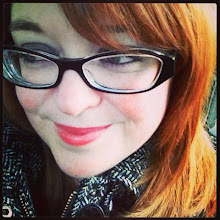"Through Deaf Eyes" is a two-hour PBS documentary that details approximately 200 years of Deaf culture in America. In this expose, Deaf individuals give their first-person accounts of how deafness has affected each of them. Six documentaries, produced by Deaf artists and filmmakers, are also featured during the film. My favorite part of viewing Through Deaf Eyes was getting to see so many native signers using American Sign Language. I am now at the half-way mark in the Deaf Studies and Interpreting program, which I am taking to fulfill a foreign language requirement, and watching and interacting with Deaf individuals is the best thing for me at this point in time. It was encouraging to pick up on so many signs that the individuals portrayed in the film used. I took my midterm after watching this film, and I actually think it helped me!
I have to say, also, that this documentary helped me reevaluate my opinions. For a while now, or as long as I've been studying DSI, I've ridden the fence when it comes to the oralism/cochlear implant debate. I've always had an appreciation for those individuals who chose to learn to communicate with the hearing world. It must take great strength and patience to do so. Those who chose to learn oral methods may also be asked to avoid the use of sign language, and that's a huge investment. After seeing the first-hand accounts this film offered, I am much more inclined to express my opposition to oralism. For the Deaf, the ability to use sign language will always prevail in the battle to achieve clear communication. It's a no-brainer. Why would we want to deter people from using sign language if it really, truly will help them communicate? Whether a Deaf individual chooses to lipread or speak or obtain a cochlear implant, sign language is a necessary tool. In the film, Kristen Harmon explained why she chooses not to use her voice. “They assume that I can hear them. And that’s the problem with speaking,” she said. “It’s a two-way communication. That’s why I don’t. I don’t want people to assume that I can hear them because I can’t. It’s much easier just to turn off my voice.” She spoke about how hard she had been working, going to school as an oralist. Eventually, she realized sign language was her language, and that it was easier and more satisfying to stick to what came natural.
I really enjoyed the comedic elements of the film. I suppose, however, these same elements may not have been so comedic for Deaf people in the past. I liked the scene with Robert Panara, who explained how his father tried everything from airplane rides to taking him to meet Babe Ruth to “shock” his hearing back into him. Next, Jack Gannon talks about how his aunt took him to a revival to cure his deafness. Of course, the religious healing didn't work, either; they said he didn't have enough faith to be cured. It amazes me that people could be so ignorant that they thought these things might help. Then again, people today are still confused about what causes deafness and how to cope with and/or cure it. I mean, we're offering cochlear implants to people when there's only a 50/50 chance the highly expensive procedure will even work. It angers me that after 200 years, we haven't found a better solution. Or if there's no solution to be found, that we haven't learned to accept deafness as a very manageable condition. We should be beyond bickering about whether ASL is a language or not, and hearing people should be better educated in Deaf Culture. While I know progress has been made in the past 200 years, there is no excuse for the injustices that continue against the Deaf still today.
Marlie Matlin's contribution to the documentary was nice, because I've always liked her (If you haven't seen What the Bleep Do We Know? you should be ashamed of yourself!). I wasn't aware of the situation she encountered the year after she won the Oscar. She attended the ceremony and was presenting the nominees for Best Actor when she chose to speak the list of names rather than signing them. Deaf people everywhere were outraged! And now I'm outraged! Yes, she was a “pioneer” for the Deaf, like Mark Morales noted in the film, but why did that all go out the window the second she chose to use her voice? This woman worked hard to get to where she did, and she should have the opportunity to communicate with others however she chooses. That's what we all need to remember: Deafness is a very personal condition, and no one but that individual has the right to decide what is best for him or her. Whether a Deaf individual chooses to use sign language only, or to obtain a cochlear implant and utilize oral methods, or to use a combination of both, it is their choice, plain and simple.
Subscribe to:
Post Comments (Atom)

No comments:
Post a Comment